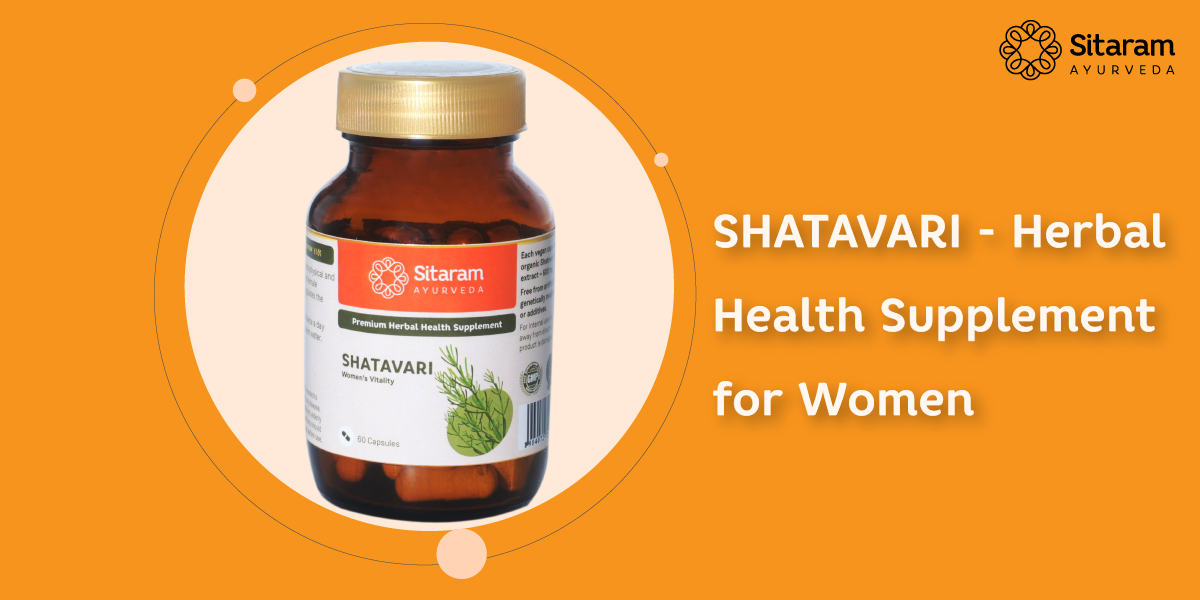Shatavari- Herbal Health Supplement For Women

What is a Herbal Supplement?
Food and Drug Administration defines dietary supplements as products taken by mouth that contain a dietary ingredient. Dietary ingredients include vitamins, minerals, amino acids, herbs or botanicals, and other substances used to supplement the diet.
Forms of Dietary Supplements available
They are available in many forms
- Liquid Tablets
- Capsules
- Powders
- Energy bars
Health issues or conditions specific to Women
a) Gynaecological health
- Menstruation and menstrual irregularities.
- Pain is the most common problem women tolerate during their periods.
- Irregular periods, heavy bleeding, unusual bleeding and missing periods are other problems she faces.
b) Urinary tract health
- Urinary tract infections are more common in women than in men.
Risk factors specific to women for urinary tract infections are
- Female anatomy- Women have a shorter urethra, and bacteria travel easily to the bladder.
- Sexual activity
- Specific birth control measures- Birth control measures like diaphragms may cause an increased risk of urinary tract infections.
- Menopause- A decline in the level of hormone oestrogen causes an increased risk of urinary tract infections.
c) Pelvic floor disorders
- Vaginitis- Inflammation of the vagina
- Bacterial vaginosis: Vaginal inflammation caused by the overgrowth of bacteria naturally found in the vagina.
d) Pregnancy issues
- Pre-pregnancy care
- Prenatal care
- Pregnancy loss(miscarriage and stillbirth)
- Preterm labour
- Premature birth
- Sudden infant death
- Breastfeeding
- Congenital disabilities
e) Diseases related to infertility
- Uterine fibroids
- PCOS
- Endometriosis
f) Issues related to women’s overall health and wellness
- Osteoporosis – Female hormone oestrogen is essential for healthy bones. After menopause, the level of oestrogen in the body falls. Menopause leads to a rapid decrease in bone density.
- Bone health
g) Mental health
- Studies show that women are more prone to experience mental issues like anxiety, depression.
Shatavari- The herbal health supplement
Botanical name – Asparagus racemosus
Family – Asparagaceae
Plant properties
Shatavari is common throughout Srilanka, India, and the Himalayas.
It grows one to two meters tall. The plant prefers to take root in gravelly, rocky soils high up in piedmont plains, at 1300-1400 m elevation.
Characteristics of the plant
Shatavari is a woody climber growing up to 1-2 m in height. The leaves are similar to pine needles, tiny and uniform. The flowers are white and have small spikes.
Ayurvedic description of the plant Shatavari
Deepana Pachana (enhances digestion)
Kasahara (relieves cough)
Dahahara (reduces burning sensation)
Pramehahara (manages diabetes)
Rasayana (rejuvenates the body)
Garbhaprada (treats infertility)
Medhya (provides intelligence)
Balya (provides strength)
Vayasthapana (anti-aging property)
Pharmacological properties of Shatavari
Studies show that Shatavari possess the following properties
a) Shatavari and female reproductive system
- Shatavari helps in treating several hormonal problems.
- Helps treat endometriosis (a painful disorder where tissues similar to the uterus grow outside the uterus).
- Powerful uterine tonic.
- Maintains reproductive hormone levels in the blood.
- Shatavari is a good supplement for women who are trying to conceive.
b) Aphrodisiac activity
- Natural aphrodisiac.
- Stimulates hormones for increasing libido in both men and women.
c) Breastfeeding
- Studies show that root extract of Shatavari increases milk secretion during lactation. Therefore Shatavari enhances milk output in women complaining of scanty breast milk.
d) Anti-stress activity
- Shatavari helps in reducing mental stress and anxiety. So it helps to increase general health.
- Shatavari also possesses antidepressant activity.
e) Anti secretory and anti-ulcer activity
- Shatavari helps in the healing of ulcers in the stomach and intestine. It helps to reduce symptoms like heartburn and regulates appetite.
f) Antibacterial activity
- Studies show that Shatavari shows antibacterial effects against E Coli, Shigella dysenteriae, Salmonella typhi etc.
g) Gastrointestinal effect
- The powdered dried root is used for treating indigestion (dyspepsia).
- It reduces symptoms like nausea, gas, stomach discomfort etc.
h) Anti-inflammatory action
- Shatavari helps to reduce inflammation.
i) Diuretic effect
- Studies show that Shatavari possesses a diuretic effect.
j) Antioxidant effect
- Shatavari also exhibits an antioxidant effect.
- Antioxidants protects the body from harmful free radicals, which can damage cells.
k) It also exhibits antitussive, anti diarrhoeal effect.
l) The plant possesses cardioprotective, hepatoprotective activities.
Shatavari dosage
- Shatavari capsule- Usually one capsule per day.
- Powder- Mix 1/2 to 1 teaspoon of Shatavari powder with milk or warm water to get good results.
It will help if you take these medicines under strict medical supervision.
Ayurvedic formulations, which include Shatavari
There are many formulations in Ayurveda which include Shatavari. In addition, physicians advise Shatavari medicines for gynecological conditions.
- Shatavari Gulam
- Dhathryadi Ghrutham
- Phalasarpis
- Satavaryadi Ghrutham
- Musalikhadiradi Kashayam
Precautions
- One should take health supplements under medical supervision only.
- People who are allergic must take necessary medical advice before use.
Shatavari- A versatile female tonic
Shatavari is beneficial in female infertility. It increases libido, cures inflammation of sexual organs, helps treat PCOD, prepares the uterus for conception, prevents miscarriages, good postpartum tonic, improves lactation, helps in menstrual disorders.
Shatavari is a beautiful supplement used wholly or as an adjuvant for the complete health of women. Shatavari used daily will improve women’s health and vitality.
To Buy Shatavari Ayurvedic Medicine: https://www.sitaramayurveda.com/product/shatavari/


 Sign In
Sign In Cart
Cart